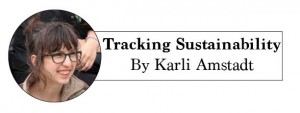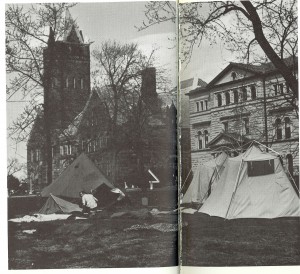By Nicole Barhorst
Transcript Correspondent
Students, faculty and Delaware residents witnessed the world premiere of “The Secret War of Emma Edmonds” last weekend.
According to the production’s flyer, the play is “based on the true story of a woman who disguised herself as a man to serve in the Civil War, also known as Franklin Thompson of the 2nd Michigan Infantry.”
The play is an original work by Ohio Wesleyan theatre professor Bonnie Milne Gardner. According to the theatre and dance department’s website, more than 20 of Gardner’s plays have been produced in professional, community and academic theaters.
“The best part was the emotional moments on stage, but I wasn’t a huge fan of the ending of the play,” sophomore Sam Borchart said. “It felt abrupt and didn’t work very well in my opinion.
Borchart said he attended the play because he “loves to support the arts” and wanted to see several of his friends act in the production.
“Seeing how well the actors recomposed themselves after a line slip-up was good to see,” said Borchart, who participated in theater while in high school.
Costume designer Jacqueline Shelley said the biggest challenge for her has been getting the play’s star, sophomore Margot Reed, in and out of her many costumes smoothly.
“She has nine costume changes and they are all quick changes,” she said. “We rehearsed the changes two nights in a row and timed them accordingly.”
Shelley said this was her first time working with military attire and creating historically accurate costumes has been a major task. A re-enactment historian was enlisted for help.
“We’ve tried to get things as near to true as possible, but sometimes the budget plays a big [role] in what we can achieve and what we can only come close to,” she said.
Director Kerry Shanklin said the biggest challenge has been “creating a smooth flow with so many different locales and with the title character’s many changes.” Throughout the play, Reed appears as both a man and a woman, as well as at various ages.
Sophomore Lauren Kiebler said she enjoyed seeing Edmonds’ life across a few different decades.
“I didn’t even know women served in the Civil War,” Kiebler said.
Although junior Colin Moore said he “did not care much for the ending,” he still thinks the OWU theatre department is “top notch” and will continue to attend its plays.
Moore said his favorite scene occurred when Edmonds was speaking with a wounded confederate soldier because it was “harrowing.”
Sophomore Nathan LaFrombois said he too favored that scene and found the overall play to be “touching.”
“I will absolutely attend more plays at OWU,” he said. “I have always enjoyed events put on by the theater department. They have quality shows and great actors.”
Kiebler also said she enjoyed the “women’s empowerment” aspect of the production and said she looks up to people like Emma.
Junior Ryan Haddad said producing the play for the first time didn’t add extra pressure on him as the show’s co-assistant dramaturg, or researcher.
“As this is a premiere, the actors and design team really get a chance to create unique performances and visuals,” he said. “There is no precedent for how the play should be done or has been done before, so they get to start fresh, which is very exciting.”
Gardner served as lead dramaturg, while Haddad and senior Matthew Jamison were both assistant dramaturgs.
As dramaturg, Haddad said he was one of the people in charge of researching information about the Civil War time period and giving it to “the cast, director, and technical staff, usually upon their request.” He said he spent 10 to 15 hours doing research during the rehearsal process.
Haddad said he and Jamison also helped with outreach for the show. He was in charge of contacting local schools and historical organizations that might be interested in attending the production.
“The Secret War of Emma Edmonds” will close its run in the Chappelear Drama Center this weekend. Performances are on Oct. 11 and 12 at 8 p.m. and Oct. 13 at 2 p.m.

